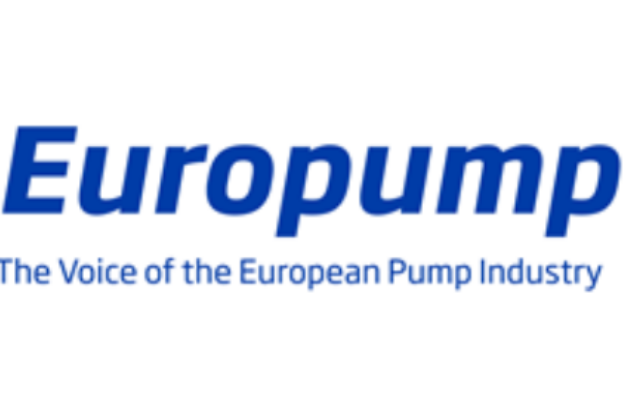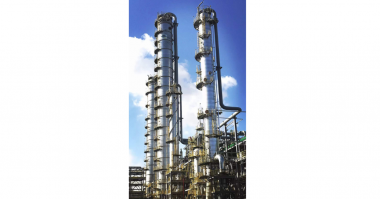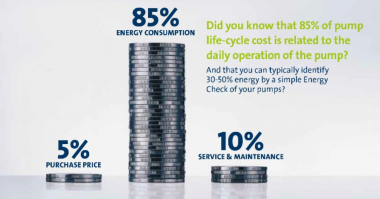Contributor: Europump
Pump manufacturing is one of the few industrial sectors where Europe continues to enjoy at least parity with, and in many cases superior economic performance to, its global competitors. For many years it has had, and continues to have, a healthy positive trade balance with the other major blocs in Asia and the Americas. Many of the most important innovations in pump technology have their roots in long-established companies within Europe, supported by a range of specialist technical organisations and universities.
Comprising 17 National Associations in 14 EU Member States, Turkey, Russia & Switzerland, Europump members represent more than 450 companies with a collective production worth of more than €10 billion and employing 100,000 people across Europe.
Established in 1960, the organisation continues to interact with governments throughout the region on a range technical, legislative and environmental issues, which include:
- the requirement to reduce the energy consumption of pumps (in EU countries, pumps account for a significant proportion of energy consumption in industrial and commercial applications)
- addressing draft EU legislation in areas such as energy efficiency, technical standards and health & safety
- supporting the framing of new EU legislation in such a way that the goals of the legislators are achieved without compromising the ability of pump manufacturers to compete internationally
- maintaining a competitive edge against global competition through matching more closely the needs of customers
One key area of activity for Europump, and its various working groups, has been its exhaustive work in relation to the EU Commission’s stated commitment to revise its 20-year-old Drinking Water Directive.
The proposed new rules update the quality standards drinking water must meet and introduce a cost-effective risk-based approach to monitoring water quality. They also contain new provisions on materials that are in contact with drinking water along with new obligations to improve access to water. Member states will also have to ensure that consumers can access information on the properties of their drinking water as well as other useful information.
Of prime interest to pump manufacturers (and therefore Europump) is of course the planned new procedure to set hygienic requirements for materials that interact with water intended for human consumption, with the aim being to improve the quality of such materials and ensure that human health is protected and that no contamination takes place.
To that effect, the technical and standards committees within Europump, have each contributed countless hours of guidance to help ensure that manufacturers of pumps and their related systems are fully able to comply with the revisions, whilst not being commercially disadvantaged in any way.
The drivers behind the revisions to the Drinking Water Directive, which is a rather broad body of work, are of course well meaning, and it is in everyone’s interest that water quality is of the highest standard. But to achieve its goals, the Directive must take full account of the knowledge and expertise of the pump manufacturing sector. Standardisation across the region is paramount, for a host of environmental, health & safety and commercial reasons, and it is through this information transfer that the correct protocols can be determined, and the final deliverables achieved.
Europump has been at the forefront of the drive for harmonisation of quality standards for products that come in to contact with drinking water since 2015, when it became instrumental in an initiative known as European Drinking Water.
EDW is an alliance of European trade associations representing industries that manufacture and supply products used in drinking water applications. Its membership which now numbers some 30 organisations includes representatives from the pump, pipe, valve, tap, seal, meter, water heater, water treatment and catering equipment industries, along with their associated material suppliers; in effect, the entire supply chain.
Throughout the past 5 years, EDW has been active in discussing the standardisation issue, establishing a common view, and preparing proposals for legislators. It has engaged and cooperated with the EU, individual member states and national regulatory authorities to establish an appropriate regulatory basis for harmonised procedures in the assessment and certification of materials that are in contact with drinking water. Indeed, Europump has long argued for a dedicated European Regulation covering materials and products of this type.
Robert Dodane of Wilo Salmson, and Chair of Europump’s Technical Commission commented, “Having already spent a great deal of time and effort in finding a pathway through the standardisation minefield, we welcome the EU’s proposed revision to the Drinking Water Directive. Indeed, adjustment to the existing provision on materials that come in to contact with water is seen by our industry as a credible approach to achieving the harmonisation we all seek, but we would strongly urge the adoption of the EDW’s suggestions in this regard.”
It is not expected that the DWD will contain a set of detailed rules, moreover a framework whereby the EU could progressively adopt lists of allowable substances and materials, test methods, verification procedures and of course the required legislative tools.
However, with each of the three European institutions (Commission, Parliament and Council) having now commented on the Drinking Water Directive, especially on the key area of materials and products in contact with water, discussion and negotiation is ongoing.
Julien Chalet of Evolis, who represents Europump within EDW, concludes, “As and when the revised Drinking Water Directive is adopted sometime in 2020, it will only be the starting point for the standardisation of hygienic requirements for materials in contact with drinking water; it will take a few more year’s before a truly comprehensive system is in place across Europe.
For further information on the work undertaken by Europump on behalf of its members and the wider pump using arena, please visit www.europump.org.
About Europump
Europump, the European Association of Pump Manufacturers, was established in 1960. It represents 17 National Associations in 14 EU Member States, Turkey, Russia & Switzerland. Europump members represent more than 450 companies with a collective production worth of more than €10 billion and employing 100,000 people across Europe.





Comments